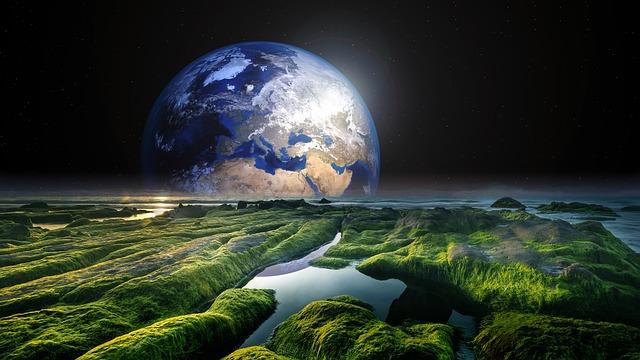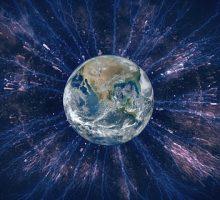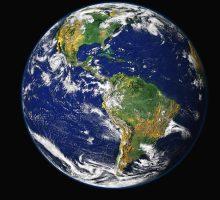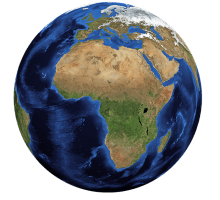The Earth is a fascinating planet, home to billions of species, diverse ecosystems, and intricate natural systems. It is our only known habitable planet in the vast universe, and its beauty and complexity are unparalleled. In this blog, we will explore the Earth’s various features, systems, and phenomena, and discuss the latest research and discoveries about our planet. Here are some of the topics we will cover:
Earth’s Formation and Evolution
The Earth formed around 4.54 billion years ago from a cloud of gas and dust that surrounded the young sun. Over time, the Earth’s surface and atmosphere changed dramatically, giving rise to the complex systems we see today. We will discuss the various stages of Earth’s evolution, including the formation of the continents, the emergence of life, and the impact of asteroid collisions.
Earth’s Structure and Composition
The Earth is composed of several layers, each with unique physical and chemical properties. We will delve into the structure and composition of the Earth’s layers, including the crust, mantle, outer core, and inner core. We will also discuss the Earth’s magnetic field, which plays a critical role in protecting the planet from harmful solar radiation.
The Atmosphere and Climate
The Earth’s atmosphere is a complex system that regulates the planet’s temperature, weather patterns, and air quality. We will explore the composition and properties of the Earth’s atmosphere, including the different layers and the gases that make up each layer. We will also discuss the Earth’s climate, including the factors that influence climate change and the impact of human activities on the planet’s climate.
The Hydrosphere and Water Cycle
The Earth’s hydrosphere, which includes all of the planet’s water, is a critical component of the Earth’s systems. We will examine the different forms of water on Earth, including oceans, lakes, rivers, and groundwater, and discuss the water cycle, which regulates the movement of water through the Earth’s systems. We will also explore the impact of climate change on the Earth’s water resources.
The Biosphere and Biodiversity
The Earth’s biosphere is the region of the planet where life exists, and it is home to millions of species, from tiny microbes to giant elephants. We will examine the different ecosystems on Earth, including forests, grasslands, deserts, and oceans, and discuss the impact of human activities on biodiversity, including deforestation, pollution, and climate change.
Natural Disasters and Hazards
The Earth is prone to various natural disasters and hazards, including earthquakes, volcanic eruptions, hurricanes, tornadoes, and wildfires. We will examine the causes and effects of these events and discuss the methods used to monitor and predict them. We will also explore the impact of human activities on the frequency and severity of natural disasters.
Sustainable Development and Conservation
As the human population continues to grow, we face the challenge of balancing economic development with environmental protection. We will discuss the concept of sustainable development and explore ways to balance economic growth with conservation efforts. We will also examine the impact of conservation efforts on biodiversity and the natural systems of the Earth.
Future of the Earth
As we continue to explore and learn about the Earth, we must also consider the future of our planet. We will discuss the potential impact of climate change, natural disasters, and human activities on the Earth’s systems and explore ways to mitigate these effects. We will also discuss the potential for space exploration and the search for other habitable planets.
Earth’s Relationship with the Sun and the Solar System
The Earth is part of a complex solar system that includes eight planets, numerous moons, and other celestial bodies. We will explore the relationship between the Earth and the sun, including the Earth’s orbit around the sun, the seasons, and the impact of solar radiation on the planet. We will also discuss the various missions and explorations that have been conducted to study the solar system.
Geology and Earth Resources
The Earth is a rich source of natural resources, including minerals, fossil fuels, and renewable energy sources. We will examine the geology of the Earth and discuss the methods used to extract and use these resources. We will also explore the impact of human activities on the Earth’s geology and the potential for alternative, sustainable sources of energy.
Indigenous Knowledge and Earth Stewardship
Indigenous communities around the world have long held a deep respect and reverence for the Earth and its systems. We will examine the traditional knowledge and practices of indigenous communities and discuss the importance of incorporating this knowledge into modern environmental management practices. We will also explore the concept of Earth stewardship and how individuals and communities can work to protect and conserve the planet.
Earth and Space Exploration
As humans continue to explore and learn about the Earth and the solar system, we must also consider the potential for space exploration and the search for other habitable planets. We will discuss the various missions and explorations that have been conducted to study the solar system and the potential for future missions. We will also explore the ethical and philosophical implications of space exploration and the search for extraterrestrial life.
Earth and Human Health
The health of the Earth’s systems is closely linked to the health and well-being of human populations. We will examine the impact of environmental factors, such as air and water pollution, climate change, and exposure to toxins, on human health. We will also discuss the importance of environmental justice and the need to address environmental disparities that disproportionately affect marginalized communities.
Earth Art and Culture
The beauty and complexity of the Earth have inspired artists and cultures throughout history. We will explore the ways in which the Earth has been depicted in art, literature, and music, and discuss the role of culture in shaping our relationship with the planet. We will also examine the potential for art and culture to inspire environmental stewardship and activism.
Earth and Technology
Advances in technology have transformed our understanding of the Earth and its systems. We will explore the various technologies used to study and monitor the Earth, including satellite imagery, remote sensing, and data analysis. We will also discuss the potential for technology to help mitigate the impact of climate change and other environmental challenges.
ScitechVenture Channel













